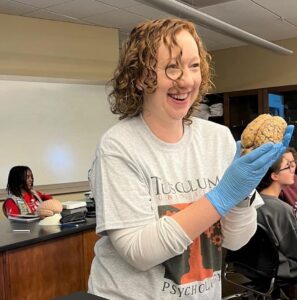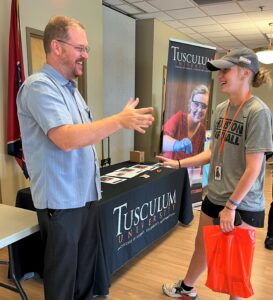The Behavioral Health concentration focuses on the connection between bio-psycho-social-spiritual components of thoughts and actions. While this concentration does include a study of mental health issues including causes, interventions, management, etc., it also focuses on positive psychology and how people generally improve their life in meaningful ways. This concentration prepares students to work with and support individuals with a variety of needs as well as prepare them to take the next step in a graduate counseling or clinical psychology programs.
Industrial-Organizational psychology is the application and scientific study of human behavior within organizations and work environments. In general, I/O Psychology focuses on issues such as recruitment, selection and placement, training, development, performance evaluations, employee motivation, reward systems, work-life balance, quality of work life, work structure and consumer behavior. I/O psychologist commonly work in industry, government and academia and as consultants. I/O Psychology provides students for a wide range of professions within industry that work with and supervise people as well as evaluating performance of both employees and the organization as a whole.
Our students explore the entire field of psychology. This means students come to understand how theories are supported by data gathering and experimental evidence and develop critical thinking skills to evaluate research contributions to the field.
 In addition to our emphasis on the scientific method, we focus on how psychological knowledge and thinking shapes our lives, communities and world while encouraging the development of active, professional, ethical and responsible citizenship. To this end, the program strongly emphasizes the integration of classroom knowledge and scientific thinking with real-life applications. Our small class sizes are ideal for this approach and provide the opportunity for individualized attention from your instructors.
In addition to our emphasis on the scientific method, we focus on how psychological knowledge and thinking shapes our lives, communities and world while encouraging the development of active, professional, ethical and responsible citizenship. To this end, the program strongly emphasizes the integration of classroom knowledge and scientific thinking with real-life applications. Our small class sizes are ideal for this approach and provide the opportunity for individualized attention from your instructors.
The psychology program prepares students for a wide range of careers, such as the helping professions – social service, health, corrections or rehabilitation. Because psychology majors have experience in collecting, evaluating, synthesizing and reporting information, they might pursue administrative, public affairs, business or computer programming positions.
 Many students enter graduate programs leading to master’s or doctoral degrees in any of the specialties within psychology (clinical, physiological, social community) or closely related fields, such as counseling, social work, law. They can also choose to combine an undergraduate psychology degree with an advanced degree in law, business, education, or some other academic or professional field.
Many students enter graduate programs leading to master’s or doctoral degrees in any of the specialties within psychology (clinical, physiological, social community) or closely related fields, such as counseling, social work, law. They can also choose to combine an undergraduate psychology degree with an advanced degree in law, business, education, or some other academic or professional field.
For more information regarding course requirements, please refer to the catalog.
Students in the Tusculum Psychology Department not only learn how to effectively plan and implement community-based projects, but they get real experience participating in them as well. These can range from mental health outreach initiatives to assisting the local homeless population.
The Tusculum Psychology Department has developed the program from the beginning to prepare students for a career. This begins with not only the courses that are offered, such as Career Options in Psychology and Practicum, to our concentrations, which prepare our students for the knowledge and skills they will need in their chosen paths.
The Tusculum Psychology Department is committed to the success of our students, not only as future professionals but as people as well. To this end, our faculty provide one-on-one advising with every student in the program. This affords students the opportunities to ensure they are on track for graduation. They have access to individuals who can help them plan for their future using our extensive expertise of the field. Perhaps most importantly, our program connects them with someone who generally invests in them as an individual.
The Tusculum Psychology Department equips students to apply psychological principles in a caring, supportive and nurturing way that mirrors a God-centered Christian environment.
The Tusculum Psychology Department provides experiential learning opportunities for each student. These can be in the form of skills-based classes, internships, community-based projects, research opportunities and other initiatives.
While our faculty are actively involved in their profession as researchers, practitioners, mentors and experts, we would like to highlight the success of some of our recent students.
Ledford Scholars
The Appalachian College Association’s Ledford Scholars Program offers financial assistance for intensive summer research projects to undergraduate students enrolled at ACA-member institutions. Below are some of our recent Ledford Scholars and details of their research:
Avery Carper
Overall, it is apparent that mental illnesses are both pervasive and undertreated in the United States. However, current literature has not fully examined the circumstances surrounding when stigma becomes a barrier to care. The purpose of the study was to identify potential demographic differences in who is currently using, or has a history of using, mental health services. Additionally, this study examined factors associated with both general stigma and self-stigma surrounding the usage of mental health services.
Sarah Calfee
Several studies have shown relationships between stress and cardiometabolic health; however, academia as a discipline has largely been ignored. As such, the study examined the relationship between both perceived stress and occupational stress – and physical and mental health outcomes. Academia is an ideal occupation to examine because it is typically easy to identify periods of high (mid-term and final exam periods) versus low stress (winter and summer breaks). Furthermore, by including both self-report and biological markers of physical health, researchers were better able to examine the impact stress has on health.
Students also have to opportunity to participate in research in conjunction with their faculty. Examples are:
In addition to formal research, the Tusculum Psychology Program encourages and supports students in their participation in regional, national, and international conferences. Past and future opportunities include:
Psychology is not only one of the most versatile majors, but also carries a high degree of satisfaction among graduates.